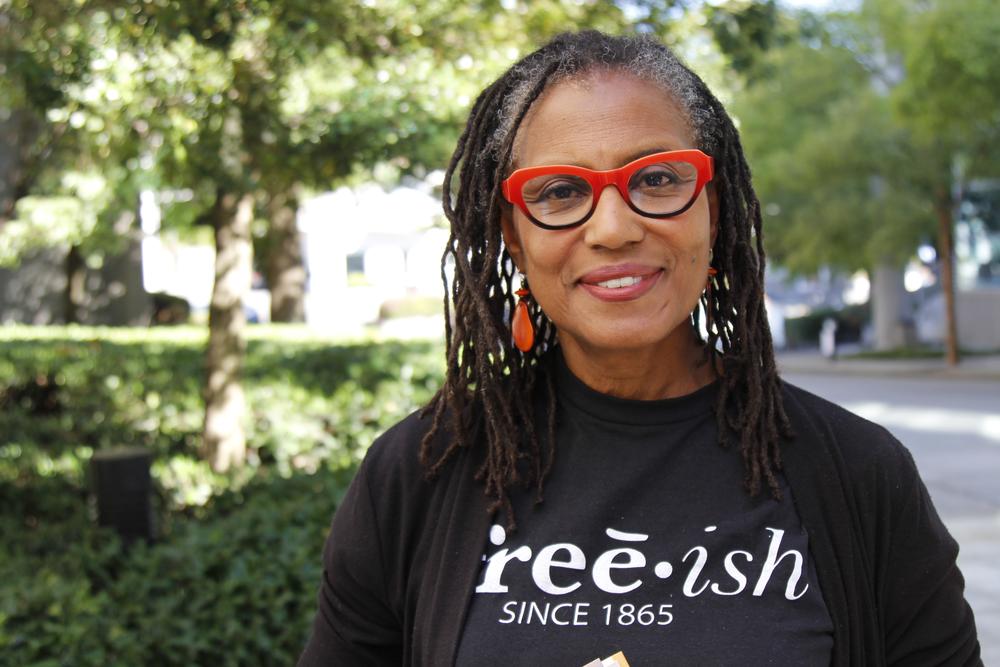
Section Branding
Header Content
Georgia Today: Families of Israeli hostages rally at Capitol; Grants for teachers; Author talk
Primary Content
LISTEN: On the Monday, Oct. 30 edition of Georgia Today: Family members of Israelis taken hostage by Hamas rally at the Georgia state Capitol for their release; new federal grants will help turn teacher's assistants into full-time teachers; and a talk with a debut novelist from Georgia who shares the story of the return of a long-lost love.

Peter Biello: Welcome to the Georgia Today podcast from GPB News. Today is Monday, Oct. 30. I'm Peter Biello. On today's episode, family members of Israelis taken hostage by Hamas rally at the Georgia State capitol for their release. New federal grants will help turn teacher's assistants into full-time teachers. And I'll talk with a debut novelist from Georgia who shares the story of the return of a long-lost love. These stories and more are coming up on this edition of Georgia Today.

Story 1:
Peter Biello: Relatives of people taken hostage by Hamas are asking Americans to call for their release. GPB's Sarah Kallis has more from their visit today to the Georgia Capitol.
Sarah Kallis: Sandy Feldman rushed to a bomb shelter in her home in Israel on Oct. 7. She stayed there for hours worrying and trying to contact family members. She told Georgia lawmakers she couldn't reach her sister and later learned she was taken hostage by Hamas.
Sandy Feldman: My sister takes care of kids, babies, and my only hope is that she's taking care of all these babies that were kidnapped without their mothers.
Sarah Kallis: Feldman, along with the Israeli consulate general in Atlanta, visited lawmakers at the Georgia state capitol to discuss the ongoing war between Israel and Hamas. For GPB News, I'm Sarah Callis.
Story 2:
Peter Biello: State Rep. Esther Panitch is renewing the push for a state definition of antisemitism. This follows the attack earlier this month on Israel and a subsequent rise in antisemitic incidents. Panitch is asking Gov. Brian Kemp to add House Bill 30 to the upcoming special session during which lawmakers will consider voting maps and further suspension of the gas tax. House Bill 30 defines antisemitism for hate crime prosecutions.
Esther Panitch: Jews need protection. We are currently not protected under the hate crimes law in Georgia. Jews are not a race and we're more than a religion.
Peter Biello: The FBI is monitoring increased threats against Jewish, Muslim and Arab American communities.
Story 3:
Peter Biello: Nearly three weeks after four inmates escaped from the Bibb County Jail, only one has been caught. And the question of how they got out in the first place has become a political fight. Bibb County Sheriff David Davis blamed the escape on the physical condition of the more than 40-year-old facility. He wants a new $100 million jail. But Macon Bibb County Mayor Lester Miller says a new jail isn't the answer.
Lester Miller: The age of that jail, in my personal opinion, based on what I know about it, has absolutely zero to do with the escape. You could build me a $100 million jail, give me a chisel and some electric tools and give me two or three hours and I can get out of that jail as well.
Peter Biello: The money for a new jail likely would have to be raised through a voter-approved special sales tax. Miller made his comments in an interview published on Friday.

Story 4:
Peter Biello: Teaching assistants in rural Georgia may soon become full-time teachers with help from federal grants. GPB's Grant Blankenship has more.
Grant Blankenship: $2.4 million in American Rescue Plan money for training paraprofessional educators who want to be teachers will be allocated by the Georgia Department of Education across 72 school districts and five charter schools. Eligible educators will receive up to $6,000 to help pay for things like tuition, fees and exam costs. Most of the grants are headed to aspiring teachers in South Georgia and the extreme north of the state. For GPB News, I'm Grant Blankenship in Macon.
Story 5:
Peter Biello: Georgia Power is asking regulators to let it secure more power generation ahead of schedule. Georgia Power CEO Kim Greene says the state's businesses are using lots of electricity and the company needs to keep up with the demand. But environmentalists aren't happy about a plan that would rely on natural gas to generate that new electricity. Nor are they happy about the part of the plan that would involve keeping some coal-fired plants running longer than expected. Environmentalists want to see cuts from CO2 emissions from those sources. In total, Georgia Power wants to build or buy more than 33,000 megawatts of power, which is enough to power nearly a million and a half homes.

Story 6:
Peter Biello: Microsoft plans to build a $1 billion data center in Rome's Floyd County. The county's development authority said today that it has approved a bond and a 12-year tax break package for the center and its promised 150 new jobs. The announcement kicks off the project's design phase. Work won't begin until at least 2027. Microsoft previously announced data centers coming to three metro Atlanta communities Douglasville, Palmetto and East Point that promise more than 200 jobs.
Story 7:
Peter Biello: If you live in South Georgia, your deadline to apply for disaster aid following Hurricane Idalia is fast approaching. FEMA says the deadline is next Monday to apply for low-interest loans to repair or replace property damaged by the storm in August. That's also when it's going to close its disaster recovery center in Cook County. The center in Lowndes County will close tomorrow, and the one in Brooks County will close on Thursday.
Story 8:
Peter Biello: A new study shows people have a positive perception of physician assistants or PAs. It also finds that putting more of them in the health care workforce would benefit patients. GPB's Ellen Eldridge reports.
Ellen Eldridge: The latest data show Georgia has nearly 4,500 people. These are medical professionals who trained in general medicine and graduate in half the time as a traditional four-year medical school. Andrzej Kozikowski is the lead researcher on the study. He says 66% of people surveyed had been treated by a PA and 91% were very satisfied with their care.
Andrzej Kozikowski: There's a severe shortage of physicians in particular specialties throughout the country — and geographically as well, so there's a modest distribution, particularly in rural areas. So these are sort of the spots where PAs are kind of filling them in.
Ellen Eldridge: The PA-certifying organizations as the profession has grown 76% in the last decade. For GPB News, I'm Ellen Eldridge.

Story 9:
Peter Biello: Imagine you loved someone 50 years ago. This someone turned down your marriage proposal and left town seemingly forever for you. Life went on. He started a family, became a grandparent. And then when you're almost 70 years old, that person suddenly returns. That's what happened to Fletcher Dukes in Anita Gail Jones's debut novel. And among the things that connect this couple is a monkey carved from a peach seed. Jones, a native of Albany, Ga., is here to speak with me about the book, which is called The Peach Seed. Welcome to the program.
Anita Gail Jones: Thank you. Thanks for having me.
Peter Biello: This book is kind of one of those classic "stranger comes to town" stories, even though she's not really a stranger, right? Altovise, years later, comes back to Albany and the peace that has settled into this family, the Dukes family, is kind of disrupted to some extent.
Anita Gail Jones: That's right.
Peter Biello: I can imagine being in Fletcher's position, right? The one that got away is suddenly back in town. And he was at that time a widower. And he's got to think about that. So how did you get into his perspective in a such an emotionally charged situation?
Anita Gail Jones: Hmm. It's the story that a lot of people gravitate to, that's — for a long time, my main pitch for the book — I, I centered it around that, that piece about Altovise being away for 50 years and then she comes back and people say, "oh, did they get back together?" It's like, "Oh, no, no, you got to read the books." So but I just really walked a mile in his shoes and just tried to imagine "what if?"
Peter Biello: So tell us about the origins of this novel, The Peach Seed. Was it the little peach seed monkey that inspired the story?
Anita Gail Jones: No, actually, it was a question for my dad. When I began the project, he had already passed away — or he was already gone to glory, as we say. But I had a question I wanted to know, how did he — He was born in the — Southwest Georgia in 1921. So he was a part of what was known as the Greatest Generation. But of course, he was not able to benefit from the promises made to that generation because of the color of his skin.
Peter Biello: Mm hmm.
Anita Gail Jones: So I wanted to know how men of his generation, Black men in the South, were able to be leaders in their homes, their churches, their communities, on their jobs — when the government, by way of actual laws and policies and the culture at large, treated them less than human. And since my dad was already gone, I was on my own for an answer. So I turned to the page. I decided to explore it through fiction.
Peter Biello: One of the main characters, Fletcher, he would have been about 20 years younger than your dad.
Anita Gail Jones: Exactly.
Peter Biello: How similar is he to your dad?
Anita Gail Jones: I use my dad as the template for Fletcher. And I thought when I started the project, I thought he would be the same age as my dad. But I quickly changed that when I knew that Fletcher needed to be 18 during the movement, the Albany movement. I wanted to him to be on the — on the cusp of manhood during that time. So I then I had to make him a lot younger. My dad's war was World War II. His war was Vietnam.
Peter Biello: Can you tell us a little bit about what was happening in Albany at the time regarding the civil rights movement?
Anita Gail Jones: Yes. The movement started with the late Charles Sherrod, who was a field secretary in the '60s. He came to Albany to work on voter registration and to work on civil rights. And he never left. He passed away last year and he did a lot of work to register people to vote. And there was a lot of that going on. That was a main focus. And Dr. King came down from Atlanta to help with the, with the movement. And he had a definite plan that later on he would identify as being too broad, that it needed to have a narrow, more narrow focus. And this is why the movement went down into history as being a failure. And it was absolutely not a failure, of course. And people on the ground kept working after King left, and they have never stopped working.
Peter Biello: Mm hmm. Well, it seems like this was one of the underreported events in the civil rights movement,
Anita Gail Jones: Definitely.
Peter Biello: because, I mean, King went a lot of places, right? But it seemed like Albany in particular was a laboratory for greater change in larger cities in the South.
Anita Gail Jones: Great way to put it. That's right. It was a labaratory and a testing ground. And it was — a lot of things were new. You know, people were figuring out how to do this. And a lot of the— a lot of them were young. Young teenagers, older teenagers and college students were the ones really propelling and working in the movement. And I found this part astonishing: that many of them would write the night before a protest. They would write their last will and testament, and they would make sure that their parents knew where their — the, if they had a car, where the key was and who was to get the car. They were planning for their own demise as they went out to protest. And we're talking about 16-, 17-, 18-year-olds. It's amazing.
Peter Biello: In this Albany movement as part of the life story of the two central characters in this book, Fletcher and Altovise, and the peach seed monkey, that little talisman carved from a peach seed: It's central to their relationship. It's also central to what happens later in the novel. I won't give it away here, of course, but this peach seed monkey, Do you have one?
Anita Gail Jones: I do. Yeah. I don't travel with it. So it's back at home. But when I was maybe 10 — 9 or 10 years old and my sister was close to 13, one of our northern neighbors — northern cousins, pardon me. He carved these beautiful little charms. He gave me one, and he gave my sister Betty one. When I started figuring out what the book would be about and who would be in it, the little monkey just jumped in. He just jumped in and said, "I want to be in this story." And it was up to me, of course, to figure out how to make him fit. So I invented the tradition that the men in the Dukes family carved these little monkeys, and they, they give them to the young boys when they come of age. At 13, they received their peach seed monkey along with the catchphrase: "This will keep the monkey off your back, because being a man is more than a notion." That was all invented. Didn't have that tradition in my family. We just had the two little monkeys that lived in boxes all their lives. But now they're seeing the light of day and he's been immortalized in the story. And he becomes the thread that just pulls you through the story. The family does not know about their ancestors. The reader gets to know because there's an ancestral story that goes right alongside the current-day story.
Peter Biello: The ancestral stories about Malik, who keeps a peach seed in his pocket. He's from northern Senegal, and you write scenes in which he's abducted and sold into slavery in America. So you get to see in your novel the original trauma, and you also see how history is passed from generation to generation. I was wondering what you were hoping to leave the reader feeling in those sections about Malik.
Anita Gail Jones: I feel that — that fiction has a beautiful opportunity for people to meet someone they might never meet and go right inside that person's head and see what makes them tick. So someone total opposite of Fletcher Dukes gets to — gets to know him, a Black man in the South, and hopefully they will read with an open mind and open heart. And open up to something they had not thought about and not try to limit Black folks to one story. That's always been the — the, the wish of some forces out there is we just have one story and we have so many stories.
Peter Biello: Well, Anita Gail Jones is the author of The Peach Seed. Thank you very much for speaking with me about it. I really appreciate it.
Anita Gail Jones: Thank you so much for having me.

Story 10:
Peter Biello: In sports, Georgia beat Florida over the weekend 43 to 20 and did so without its top receiver tight end Brock Bowers. Bowers leads Georgia with 41 receptions. He's also got four touchdowns. The junior is expected to miss at least a month following ankle surgery. The win extended Georgia's school-record winning streak to 25 games and 24 straight SEC games. And in basketball, the Hawks beat the Milwaukee Bucks yesterday, 127 to 110. The Hawks host the Timberwolves this evening.
And that's all we've got for this edition of Georgia Today. Thank you so much for listening. If you want to learn more about any of these stories, visit GPB.org/news. And remember to subscribe to this podcast; we'll be back in your podcast feed tomorrow afternoon with all the top stories from the Peach State. And as always, if you've got feedback or a story idea, we would love to hear from you. Email us. The address is GeorgiaToday@GPB.org. I'm Peter Biello. Thanks again for listening. We'll see you tomorrow.
---
For more on these stories and more, go to GPB.org/news



